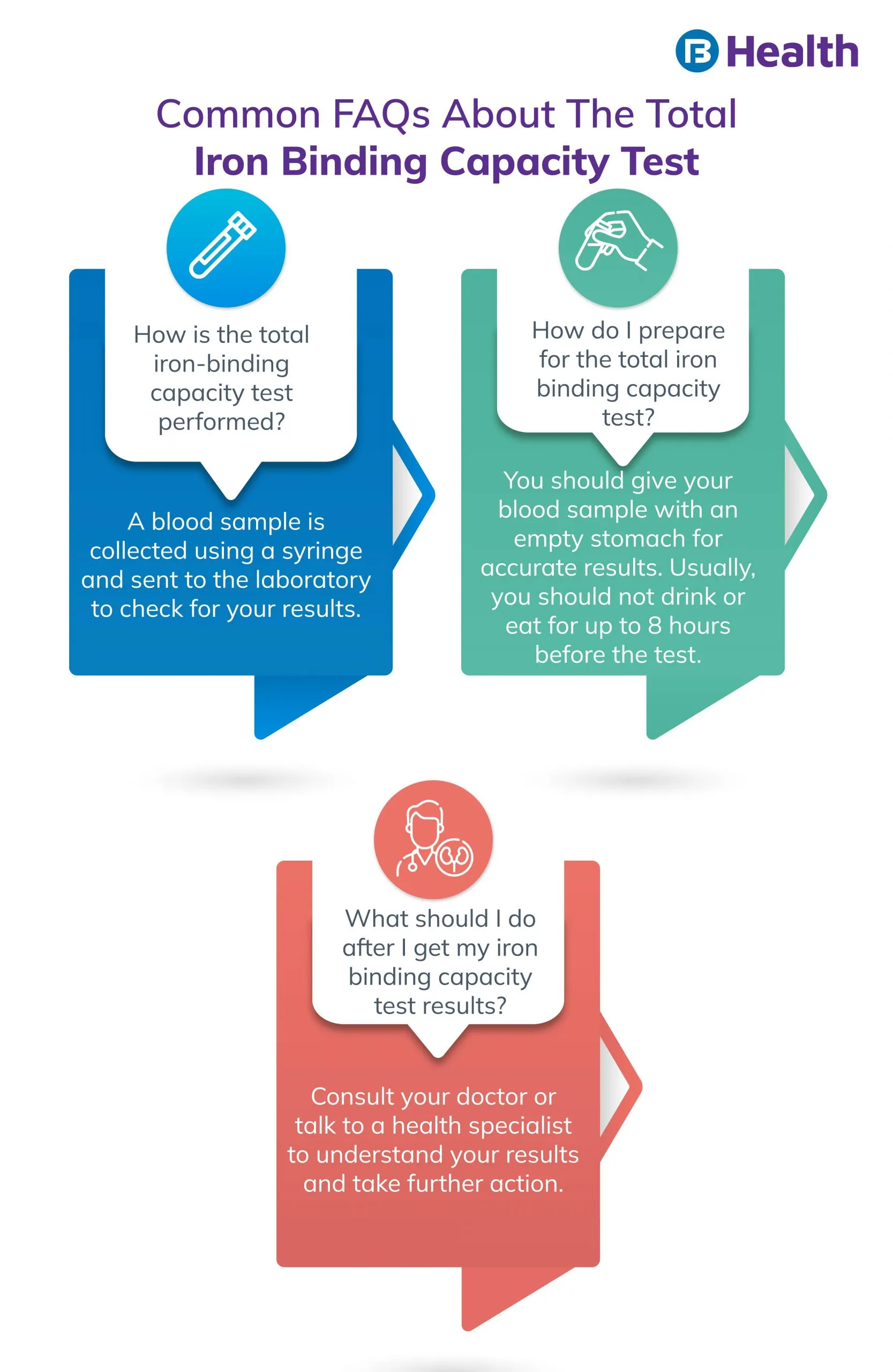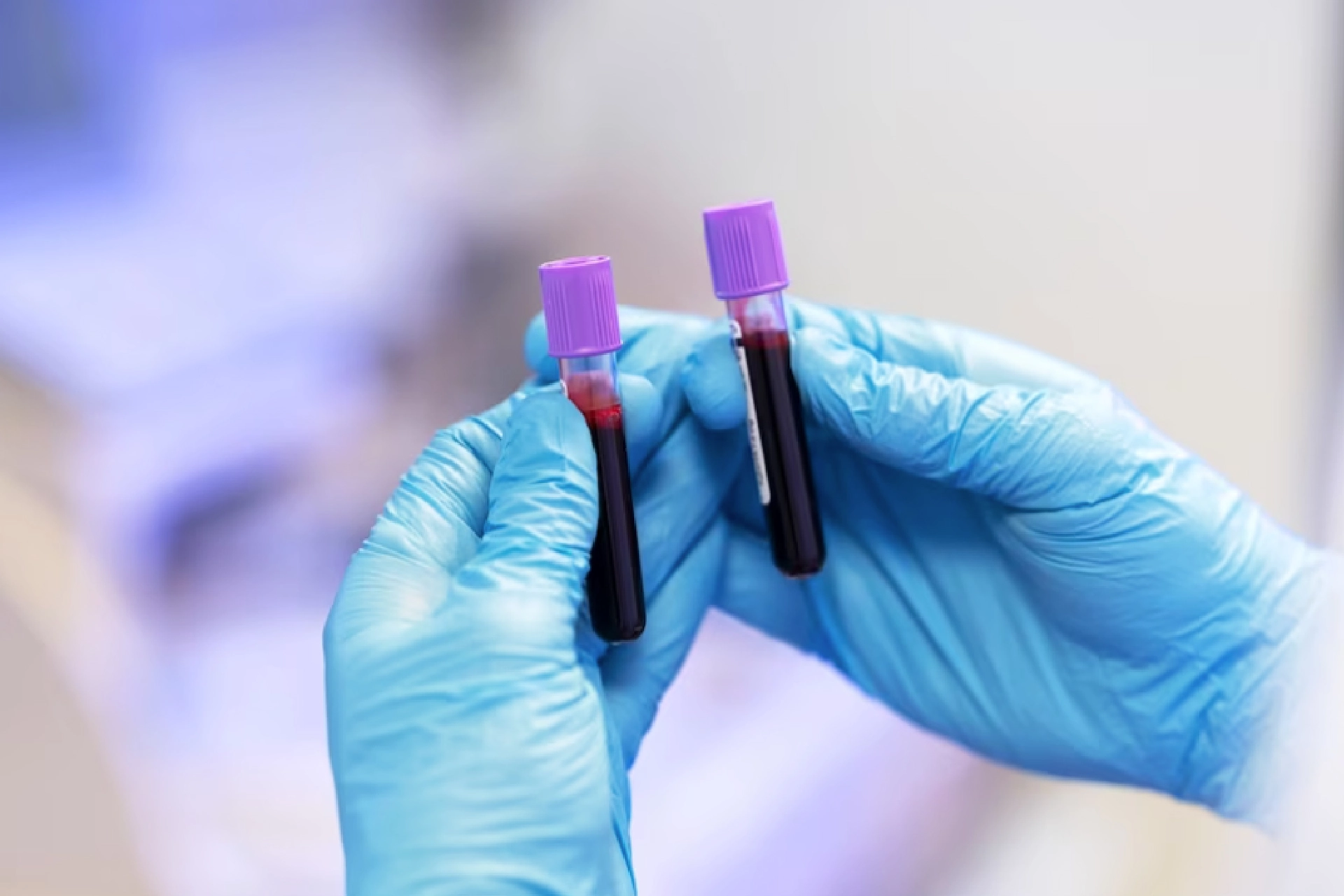Health Tests | 4 min read
Total Iron Binding Capacity Test: 5 Important Things to Know
Medically reviewed by
Table of Content
Key Takeaways
- Iron binding capacity levels reflect how well iron is functioning in your body
- Normal levels of total iron binding capacity depend on your gender and age
- Iron binding capacity tests are lab tests which have no or very little risk
With the total iron binding capacity test, doctors look for the level of iron in your bloodstream. They may suggest this blood test as a part of other health tests to check for iron deficiency. Read on to understand more about the iron binding capacity test and the role of TIBC in iron deficiency, anemia, and other conditions.
What exactly is the total iron binding capacity test?
Your liver makes a substance called transferrin. This is a protein that binds to the iron present in your blood. This is the protein that carries oxygen. The iron binding capacity test shows how much transferrin in your blood is binding to the iron and thus reflects how effectively the iron is boosting your body's functions.
As doctors check your total iron binding capacity, high levels indicate that the iron is functioning well in your body. Once transferrin and iron are attached, it is used to make hemoglobin and red blood cells.
The two different kinds of iron binding capacity are total iron binding capacity and unsaturated iron binding capacity. Normal levels of iron binding capacity levels depend among individuals across ages and genders, for example:
- Normal TIBC results for children are between 50 to 120 mcg/dl
- Normal TIBC results for women are between 50 to 170 mcg/dl
- Normal TIBC results for men are between 65 to 175 mcg/dl [1]

Why do you need a total iron binding capacity test?
Iron is an important mineral to lead a healthy life, but you may lose iron due to various reasons like periods, sweating, and shedding of your skin. As your body cannot prevent the loss of iron, it makes sure to control the intake of the mineral.
When it comes to iron, note that both lack and excess of this mineral can be hazardous for your health. While low iron levels can make you weak, the presence of more than required iron may severely affect your vital organs.
Doctors may prescribe the total iron-binding capacity test if you have the following signs:
- Weakness [2]
- Pale skin
- Tiredness
- Stomach ache
- Getting sick constantly
- Feeling cold and shivers
- Problems in children with respect to the growth of the brain
- Swollen tongue
- Pain in joints
Your doctor may also prescribe the total iron binding capacity test if you are pregnant to make sure your iron levels are proper.

What are the risks associated with a total iron binding capacity test?
The total iron binding capacity test is a fairly simple test, so there are little or no risks involved. You may experience slight discomfort, light-headedness, or faintness. However, these symptoms pass as soon as you eat something or take a rest. You can continue with your daily activities after your sample is collected.
What does it signify when your total iron binding capacity is low?
Having a low total iron binding capacity means you have hardly any free transferrins left to attach to iron. It further implies your body has high levels of iron.
Here are a few conditions that can result in high levels of iron:
- Frequent transfusion of blood due to thalassemia
- Lead poisoning [3]
- Iron poisoning
- Liver cirrhosis
- Hemolytic anemia a condition that kills your red blood cells
Why is total iron binding capacity high when you have iron deficiency?
It is important to understand the links between iron deficiency, transferrin, and total iron binding capacity test result to find the answer to this question. Always remember that low iron in your body means a lot of free transferrins, and that’s why it reflects a high value in the total iron binding capacity test result. It also makes you susceptible to iron deficiency anemia, where your body lacks the iron resources to produce sufficient red blood cells.
Deficiency of iron can happen due to conditions like celiac disease, pregnancy, and loss of blood, or case you follow a vegan or vegetarian diet.
Additional Read: Aarogyam C Package: What Are Its Benefits and 10 Major Health Tests Under ItThe total iron binding capacity test is an important part of your overall health tests. So, make sure you get it checked from time to time. Take an online consultation with the best doctors near you on Bajaj Finserv Health to understand when you take this test. To make preventive health tests easy on your pocket, you can also cover these and other healthcare expenses with a Complete Health Solution plan under Aarogya Care. This health insurance plan offers benefits like unlimited doctor consultations online, preventive healthcare solutions, lab test discounts, and more. Stay ahead in terms of your health with comprehensive healthcare!
References
- https://www.urmc.rochester.edu/encyclopedia/content.aspx?contenttypeid=167&contentid=iron_total_iron_binding_capacity
- https://www.mayoclinic.org/diseases-conditions/iron-deficiency-anemia/symptoms-causes/syc-20355034
- https://www.ncbi.nlm.nih.gov/pmc/articles/PMC6388122/
Disclaimer
Please note that this article is solely meant for informational purposes and Bajaj Finserv Health Limited (“BFHL”) does not shoulder any responsibility of the views/advice/information expressed/given by the writer/reviewer/originator. This article should not be considered as a substitute for any medical advice, diagnosis or treatment. Always consult with your trusted physician/qualified healthcare professional to evaluate your medical condition. The above article has been reviewed by a qualified doctor and BFHL is not responsible for any damages for any information or services provided by any third party.



